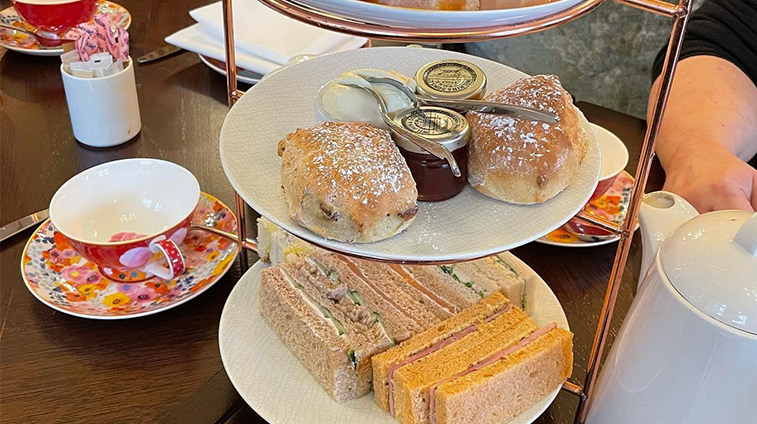
From a simple cup of tea and a muffin to a full spread of scones, cakes, finger sandwiches, and a spread of fine China and doilies, there are many different ways to have tea in line with British tradition. Whether you want to prepare the perfect teatime for yourself at home, or you want to be able to order like a pro during your next trip to the U.K., read on and learn about the different types of teatimes you can enjoy!
Elevenses
Time: 11 a.m.
This midmorning tea is often used as a break from work. This is a very simple tea, usually a cup of tea joined by a small snack. These snacks are usually a baked good like a muffin or scone and a couple of cookies (biscuits). In more recent years, this phrase became more well-known on an international scale thanks to the Lord of the Rings film franchise. During The Fellowship of the Ring, hungry hobbits Merry and Pippin fear that their ranger guide is not familiar with this teatime!
Afternoon Tea
Time: 3 – 5 p.m.
Funnily enough, this teatime is what many people have in mind when they hear the phrase “high tea!” This tea is a more formal affair and the type of tea where etiquette is key. While there are many rules, the best place to start is to take slow sips with no slurping and to not clink your spoon against the inside of your cup.
There are three types of afternoon tea, each including a little more than the last. Firstly, there is cream tea. Similar to elevenses, cream tea is just tea and a baked good – but it’s specifically a scone with some clotted cream and jam. This teatime comes from the southwest part of England in the counties of Devon and Cornwall, where it is most commonly served.
Next is light tea. This afternoon tea includes the scones, cream, jam and tea you would find in a cream tea, but light tea includes more sweets! Some things you may find include Madeline cookies, Battenburg (or window) cakes, and ornate petite fours.
The final afternoon tea is the most elabourate, and the one that folks have seen in the movies and expect when it comes to having tea. Take everything from cream tea and light tea and add some savoury items to the menu. Most common are tea sandwiches, the neat, crustless small bites with some combination of bread, meat, vegetable and a spread. The items are served on a neat, 3-tiered serving stand, and proper etiquette is to eat the “savouries” from the bottom tier and to work your way up.
High Tea
Time: 5 – 7 p.m.
High tea is a much less formal affair than afternoon tea. It is believed that the word “high” is more in reference to the table at which the tea is served than the level of etiquette or finery. Because high tea offers a heartier meal, it is served at a higher table versus the low tables you would find snacks on.
Unlike elevenses, a planned break from work, high tea really came to be to compensate for a lack of breaks. Working class people had high tea as soon as the workday was over. They needed to satiate the hunger that would build up over that full workday, and was often called “meat tea.” The luxury of a cold, dainty tea sandwich and a fancy teacup with saucer was swapped for a warm mug of tea, meat, potatoes, beans, pies, and other hot dishes! Etiquette is less of a concern here, as nourishment is the primary purpose versus pomp and circumstance.
This type of teatime is still observed today but is often incorrectly ordered when someone really intends to indulge in an afternoon tea.
Now, you will not make that mistake. Go forth with your newfound tea knowledge and enjoy whatever teatime you truly desire!

